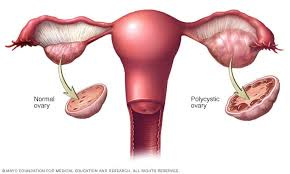Ovarian cyst syndrome and its effect on egg maturation

Polycystic ovary syndrome and its effect on egg maturation Polycystic ovary syndrome or polycystic ovary syndrome is the most common endocrine disorder in women. One of the causes of infertility in women is anovulation and polycystic ovary syndrome is the most important cause of this type of infertility. In this disease, female hormones are secreted in excess of the required amount, and this causes disorders in the affected body, such as infertility, obesity, hair loss and irregular menstruation. But what effect does this hormonal disorder have on the ovaries? The egg is surrounded by a group of cells called granulosa cells. Granulosa cells actually play the role of egg nurses. These are the cells that carry nutrients and environmental messages to the egg through their extensive communication and provide a good environment for it to grow and mature. In fact, it is the granulosa cells that detect the presence of female hormones in the environment and transmit the corresponding message to the growing egg. Thus, hormonal disorders affecting ovulation first affect the granulosa cells and the secondary effect is transmitted to the egg. The question is, what effect do hormonal disorders caused by peristaltic ovarian syndrome have on granulosa cells? In a study conducted jointly by Dr. Mehdizadeh, Dr. Platonian and colleagues at Iran University and the Royan Research Institute, an attempt was made to measure the amount of female hormone receptors in the granulosa cells of women with peristaltic ovarian syndrome and compare it with the amount of receptors in normal women. Answer part of this question. The study, published in the journal Gynecological Endocrinology, found that female hormone receptors were significantly lower in women with polycystic ovary syndrome than in normal women. This finding suggests that a decrease in the amount of hormone receptors in granulosa cells can be one of the causes of defects in oocyte maturation. Further study can reveal the relationship between this disorder and ovarian maturation disorders.



Your Comment :